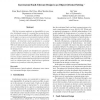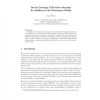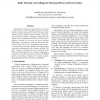384 search results - page 4 / 77 » Formal Development of Reactive Fault Tolerant Systems |
APAQS
2001
IEEE
13 years 11 months ago
2001
IEEE
With the increasing emphasis on dependability in complex, distributed systems, it is essential that system development can be done gradually and at different levels of detail. In ...
TPDS
2010
13 years 2 months ago
2010
In the past, some research has been done on how to use proactive recovery to build intrusion-tolerant replicated systems that are resilient to any number of faults, as long as reco...
ATVA
2007
Springer
14 years 1 months ago
2007
Springer
Fault tree analysis is a traditional and well-established technique for analyzing system design and robustness. Its purpose is to identify sets of basic events, called cut sets, wh...
GI
2005
Springer
14 years 1 months ago
2005
Springer
: Intrusion tolerance is a recent approach to deal with intentional and malicious failures. It combines the research on fault tolerance with the research on security, and relies on...
LCN
2005
IEEE
14 years 1 months ago
2005
IEEE
Algorithms by which peers join and leave structured overlay networks can be classified as passive or active. Passive topology maintenance relies on periodic background repair of n...



